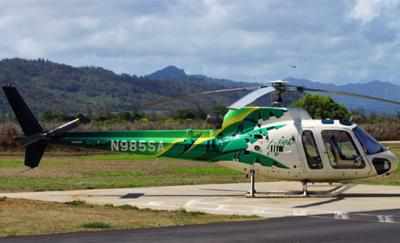Fri, May 13, 2022
NTSB Alleges FAA Could Have Prevented Tour Helicopter Crash
Earlier this week, the National Transportation Safety Board (NTSB) alleged that the Federal Aviation Administration (FAA) was negligent in preventing the fatal crash of an Air Tour Helicopter in 2019.

On 26 December 2019, an Airbus AS350 B2 helicopter that was being used for Air Tours by Safari Aviation crashed in Kekaha, Hawaii, killing the pilot and all six passengers after possibly entering instrument meteorological conditions (IMC).
The NTSB stated that as early as 2013, they emphasized [to the FAA] the need for more ‘flight information’ that they [NTSB] could use in possibly reconstructing the factors involved in accidents, and in drafting operating recommendations to avoid future recurrences. The NTSB also cited a general lack of up-to-date weather conditions, information about unusual/atypical weather, and lack of specialized in-flight weather training for air tour operators as factors that could have avoided the fatal crash of 2019.
Investigators stated that the air tour pilot was highly experienced who also served as the air tour company’s Chief Pilot and Check Airman, and still managed to get himself into a situation from which he could not recover. The terrain interference coupled with sparseness of weather observation systems, subsequently spotty radio communications and flight-tracking leaves a lot up to the pilot to evaluate as they go. You may recall the Civil Air Patrol crash on 29 March 2022 which had departed Lihue Airport and met its fatal end with two pilots aboard some 13 miles north in Kekhana. According to eyewitnesses, deteriorating weather was a contributing factor.
In the authors opinion, the NTSB appears to be using this incident to again push for the installation of flight data recorders. While the data recorders are good for evaluating after the crash, a more pressing need, it seems is the availability of real-time weather, information sharing, and training/awareness for the atypical/unusual weather common to the area.
More News
From 2023 (YouTube Edition): "Ain’t Your Daddy’s Super Cub”—Don Wade Co-owned by Don and Ron Wade—the former of Don’s Dream Machines, a storied >[...]
Pilot-Rated Passenger Reported That The Pilot Did Not Adequately “Round Out” The Landing Flare And The Airplane Bounced And Yawed To The Right Analysis: The pilot state>[...]
Dead Reckoning Dead reckoning, as applied to flying, is the navigation of an airplane solely by means of computations based on airspeed, course, heading, wind direction, and speed,>[...]
Aero Linx: Lake Amphibian Club This website is created and sponsored by the Lake Amphibian Club, to help spread the word about these wonderful, versatile amphibians that can land j>[...]
“I am deeply honored to be sworn in as NASA administrator. NASA’s mission is as imperative and urgent as ever — to push the boundaries of human exploration, ignit>[...]
 Classic Aero-TV: In Praise of Alabamas Patriot Aircraft USA
Classic Aero-TV: In Praise of Alabamas Patriot Aircraft USA NTSB Final Report: Cirrus Design Corp SR22
NTSB Final Report: Cirrus Design Corp SR22 ANN's Daily Aero-Term (12.21.25): Dead Reckoning
ANN's Daily Aero-Term (12.21.25): Dead Reckoning ANN's Daily Aero-Linx (12.21.25)
ANN's Daily Aero-Linx (12.21.25) Aero-News: Quote of the Day (12.21.25)
Aero-News: Quote of the Day (12.21.25)



